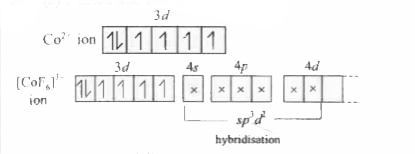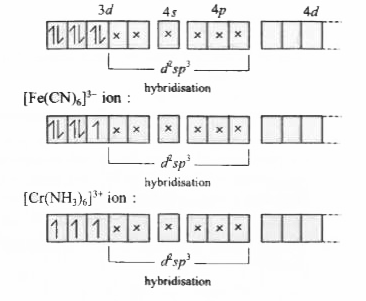In which of the following complex ion, the central metal ion is in a state of sp3d2 hybridisation ? Solution in Kannada
[CoF6]3−
[Co(NH3)6]3+
[Fe(CN)6]3−
[Cr(NH3)6]3+
The correct Answer is:A
Electronic configurations of :

F−, being a weak ligand cannot cause forcible pairing of electrons within d subshell and forms outer orbital octahedral complex.
[Co(NH3)6]3+ ion :

NH3 and CN− are strong ligands, so they form inner orbital octahedral complex.
Topper's Solved these Questions
Similar Questions
15 moles of H2 and 5.2 moles of I2 are mixed and allowed to attain equilibrium at 500∘C. At equilibrium, the concentration of HI is found to be 10 moles. The equilibrium constant for the formation of HI is
View SolutionThe number of unidentate ligands in the comples ion is called
View SolutionWhich of the following complexes are not correctly matched with the hybridisation of their central metal ions ?
View SolutionIn which of the following complex ion, the central metal ions is in a state of sp^(3)d^(2) hybridization ?
View SolutionWhich of the following complexes are not correctly matched with the hybridisation of their central metal ion ? (a) [Ni(CO)_4] , sp^(3) (b) [Ni(CN)_4]^(2-) , sp^(3) (c ) [CoF_6]^(3-) , d^(2)sp^(3) (d) [Fe(CN)_6]^(3-) , sp^(3)d^(2) Select the correct option :
View SolutionThe geometry of a complex due to dsp2 hybridisation in the central metal ion is
View SolutionThe d-orbitals involved in sp^(3)d^(2) or d^(2)sp^(3) hybridization of the central metal ion are:
View SolutionAssertion: Transition metal ion forming octahedral complexes undergo sp3d2ord2sp3 hybridisation.
Reason: Strong field ligands force the unpaired electrons of central metal ion to pair up causingg d2sp3 hybridisation whereas weak field ligands do not affect electronic configuration of the metal ion undergoes in sp3d2 hybridisation.
View SolutionThe state of hybridisation of the central atom of which of the following is sp^(3)d^(2) -
View SolutionIn which of the following metal ions hybridisation state in sp3d2 /
View SolutionThe d-orbitals involved in sp^(3)d^(2) or d^(2)sp^(3) hybridization of the central metal ion are:
View SolutionAssertion: Transition metal ion forming octahedral complexes undergo sp3d2ord2sp3 hybridisation.
Reason: Strong field ligands force the unpaired electrons of central metal ion to pair up causingg d2sp3 hybridisation whereas weak field ligands do not affect electronic configuration of the metal ion undergoes in sp3d2 hybridisation.
View Solutionनिम्नलिखित में से किस संकुल आयन में, केन्द्रीय धातु आयन sp3d2 संकरण अवस्था में पाया जाता है
View SolutionThe d-orbitals involved in sp^(3)d^(2) or d^(2)sp^(3) hybridisation of the central metal ion are :
View SolutionThe d-orbitals involved in sp3d2ord2sp3 hybridization of the central metal ion are:
View Solution

